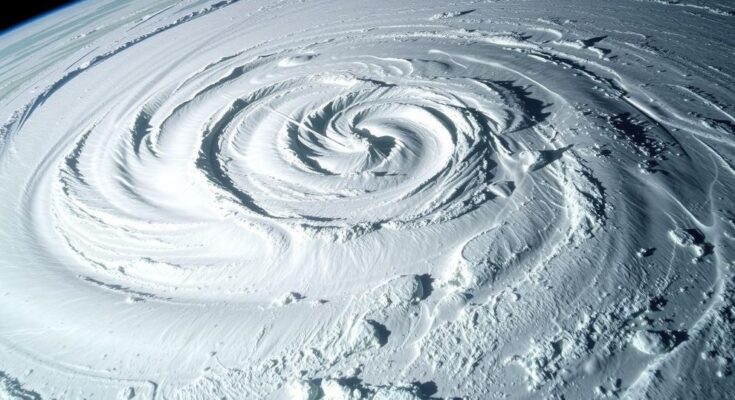Cyclone Chido struck Mayotte on December 14, 2024, with devastating effects, leaving widespread destruction and a rising death toll. The cyclone, characterized as a strong Category 4 hurricane, severely impacted infrastructure and led to a blackout across the island. Following Mayotte, the cyclone also affected Mozambique, prompting significant humanitarian concerns in both regions.
On December 14, 2024, Cyclone Chido ravaged the islands of Mayotte, resulting in widespread destruction and a substantial loss of life. Captured through powerful satellite imagery from NASA, the cyclone exhibited hurricane-force winds that wreaked havoc on this French overseas region in the Indian Ocean. Preliminary reports indicate that while only 21 fatalities have been officially recorded, the actual death toll may reach into the hundreds or thousands.
Cyclone Chido originated as a tropical disturbance on December 5, rapidly intensifying and affecting the Mauritian islands of Agaléga by December 11. The cyclone reached peak winds of 155 miles per hour, categorizing it firmly as a strong Category 4 hurricane on the Saffir-Simpson scale. The cyclone traversed conditions favorable for sustaining such intensity, including warm sea temperatures and low wind shear. On December 13, it passed just north of Madagascar, making direct landfall in northern Mayotte the next day.
Satellite imagery from the Visible Infrared Imaging Radiometer Suite (VIIRS) on the NOAA-20 satellite vividly illustrates Mayotte fully engulfed by the violent storm at 10:15 a.m. Universal Time on December 14. French officials have characterized the destruction as unprecedented, necessitating immediate aid mobilization. Minister of the Interior Bruno Retailleau remarked, “What awaits France in Mayotte is colossal: the island is devastated.”
President Emmanuel Macron underscored the seriousness of the situation, stating that all necessary emergency measures have been initiated to assist residents. He plans to visit Mayotte shortly to provide support and alleviate the strife confronting the island’s inhabitants. The severity of Cyclone Chido’s impact has been noted by Météo-France, asserting it as the strongest cyclonic event to hit Mayotte in over nine decades.
The European Union’s initial satellite assessment highlights extensive structural damage, notably in the capital city of Mamoudzou and critical infrastructure like the airport control tower and the main hospital. The cyclone has severely disrupted electricity supply, leaving tens of thousands without power and complicating recovery efforts, particularly in light of Mayotte’s limited resources as the poorest territory in the European Union.
Chido did not stop at Mayotte; it continued to affect Mozambique, where, on December 15, it made landfall with equivalent Category 4 winds. Reports indicate that approximately 174,000 individuals have been impacted in Mozambique, with at least 34 fatalities and extensive property loss. Cyclone Chido is anticipated to dissipate over Zimbabwe later this week.
Cyclone Chido’s formation and trajectory highlight the increasing frequency and severity of extreme weather events, likely exacerbated by climate change. As a potent tropical cyclone, Chido’s effects emphasize the vulnerability of island nations and regions with limited infrastructure and economic capacity to withstand such disaster. The use of satellite technology, such as that employed by NASA, provides crucial insights into the scope and scale of these meteorological events, aiding in damage assessment and disaster response efforts.
The catastrophic impact of Cyclone Chido on Mayotte and Mozambique serves as a stark reminder of the challenges posed by natural disasters, particularly in regions with inadequate resources. As recovery efforts commence, the commitment of French authorities to provide aid and restore infrastructure will be critical. This event also raises awareness about the necessity of preparedness and resilience in the face of climate-related adversities.
Original Source: www.newsweek.com




